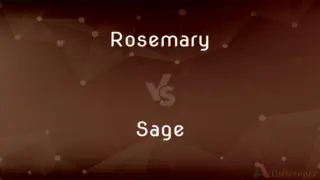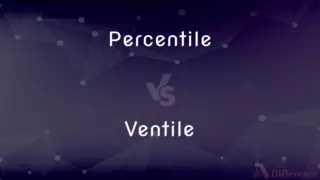Vignette vs. Montage — What's the Difference?
By Tayyaba Rehman & Fiza Rafique — Updated on May 7, 2024
A vignette is a brief, focused scene or story, often highlighting a single moment, while a montage is a series of short scenes or images edited together to show the passage of time, development, or thematic connections.

Difference Between Vignette and Montage
Table of Contents
ADVERTISEMENT
Key Differences
A vignette is a short, descriptive scene that captures a moment or theme without needing a full plot. A montage, on the other hand, is a sequence of short clips or images that convey a larger idea or progression through juxtaposition.
Vignettes often emphasize specific emotions, settings, or characters by zeroing in on one snapshot of the broader narrative. Montages, however, rely on rapid editing and a series of shots to create a cohesive story or illustrate the passage of time.
Vignettes are commonly found in literature, providing a concise but vivid description. In contrast, montages are a technique primarily used in film and television to visually summarize events quickly.
Vignettes offer a window into a world through detail and subtlety. Montages, on the other hand, are more direct in their storytelling, using visual or thematic links to convey a message quickly.
Vignettes usually focus on a single topic, idea, or experience. Montages typically include multiple related ideas to show a larger transformation or process.
ADVERTISEMENT
Comparison Chart
Medium
Literature, film, photography
Primarily film, television
Purpose
Highlight a single moment/idea
Show progression, passage of time
Structure
Brief, self-contained scene
Series of short, juxtaposed clips
Use of Details
Deep focus on setting, character, etc.
Less focus, often broad strokes
Visual Presentation
Usually static or minimally edited
Rapidly edited, dynamic visuals
Compare with Definitions
Vignette
A brief but expressive description or story.
The author wrote a series of vignettes depicting life in a small village.
Montage
A film editing technique combining a series of images or clips.
The director used a montage to depict the character's training journey.
Vignette
A gradual fading of an image at the edges.
The photographer used a vignette effect to draw attention to the subject.
Montage
A collection of images or scenes arranged to convey a theme.
The montage of family photos beautifully captured their bond over the years.
Vignette
A small illustration or photograph.
Each chapter of the novel was introduced by a vignette illustrating the main theme.
Montage
The technique of combining separate elements to create a new whole.
The artist used montage to blend surreal images into one cohesive artwork.
Vignette
An ornamental border around a picture or title.
The book's cover featured an intricate vignette around the author's name.
Montage
A visual sequence often accompanied by music to enhance storytelling.
The training montage was set to upbeat music to motivate viewers.
Vignette
A short scene focusing on a specific theme or moment.
The film included a poignant vignette showing the protagonist's childhood.
Montage
A rapid sequence summarizing the passage of time.
The movie's montage showed the protagonist moving through different stages of life.
Vignette
A decorative design placed at the beginning or end of a book or chapter of a book or along the border of a page.
Montage
The technique of selecting, editing, and piecing together separate sections of film to form a continuous whole
Montage sequences
Montage was a useful device for overcoming the drawbacks of silent film
Vignette
An unbordered picture, often a portrait, that shades off into the surrounding color at the edges.
Montage
A single pictorial composition made by juxtaposing or superimposing many pictures or designs.
Vignette
A short, usually descriptive literary sketch.
Montage
The art or process of making such a composition.
Vignette
A short scene or incident, as from a movie.
Montage
A relatively rapid succession of different shots in a movie.
Vignette
To provide (a photograph or image) with indistinct or fading edges.
Montage
The juxtaposition of such successive shots as a cinematic technique.
Vignette
To describe in a brief way.
Montage
A composite of closely juxtaposed elements
A montage of voices on an audiotape.
Vignette
(architecture) A running ornament consisting of leaves and tendrils, used in Gothic architecture.
Montage
To use or incorporate in a montage.
Vignette
(printing) A decorative design, originally representing vine branches or tendrils, at the head of a chapter, of a manuscript or printed book, or in a similar position.
Montage
(countable) A composite work, particularly an artwork, created by assembling or putting together other elements such as pieces of music, pictures, texts, videos, etc.
Vignette
(by extension) Any small borderless picture in a book, especially an engraving, photograph, or the like, which vanishes gradually at the edge.
Montage
(uncountable) The art or process of doing this.
Vignette
(by extension) A short story or anecdote that presents a scene or tableau, or paints a picture.
Montage
(transitive) To combine into, or depict as, a montage.
Vignette
(philately) The central pictorial image on a postage stamp.
Montage
A paste-up made by sticking together pieces of paper or photographs to form an artistic image;
He used his computer to make a collage of pictures superimposed on a map
Vignette
(photography) The characteristic of a camera lens, either by deficiency in design or by mismatch of the lens with the film format, to produce an image smaller than the film's frame with a crudely focused border. Photographers may deliberately choose this characteristic for a special effect.
Vignette
(photography) Any effect in a photographic picture where qualities vanish towards the edges.
Vignette
(computer graphics) A hardware deficiency (even occurring in most expensive models) of a computer display wherein the picture slants towards a colour or brightness towards the edges especially if viewed from an angle.
Vignette
(automotive) A small sticker affixed to a vehicle windscreen to indicate that tolls have been paid.
Vignette
To make, as an engraving or a photograph, with a border or edge gradually fading away.
Vignette
A running ornament consisting of leaves and tendrils, used in Gothic architecture.
Vignette
A decorative design, originally representing vine branches or tendrils, at the head of a chapter, of a manuscript or printed book, or in a similar position; hence, by extension, any small picture in a book; hence, also, as such pictures are often without a definite bounding line, any picture, as an engraving, a photograph, or the like, which vanishes gradually at the edge.
Vignette
A picture, illustration, or depiction in words, esp. one of a small or dainty kind.
Vignette
To make, as an engraving or a photograph, with a border or edge insensibly fading away.
Vignette
A brief literary description
Vignette
A photograph whose edges shade off gradually
Vignette
A small illustrative sketch (as sometimes placed at the beginning of chapters in books)
Common Curiosities
Can a vignette or montage stand alone as an independent work?
Yes, both can be standalone works if they effectively capture a theme or message.
Can a vignette be part of a larger work?
Yes, vignettes often appear in books or films as standalone scenes within a larger narrative.
Is a montage a type of vignette?
No, they are distinct techniques, with montages focusing on progression through editing, while vignettes are singular snapshots.
Is a vignette always written in prose?
No, vignettes can also appear in visual art, film, or photography.
Do montages always require music?
Music often accompanies montages to create a rhythm or mood but isn't strictly required.
Do vignettes often include dialogue?
Not always, but when included, dialogue is usually concise to focus on the moment.
Can montages be used for comedic purposes?
Absolutely, comedic montages use exaggeration or visual gags for humor.
Are vignettes always non-linear?
Vignettes can be linear or non-linear, depending on how they're used within the story.
Is a vignette similar to a short story?
They share similarities, but vignettes are often more focused on a specific moment rather than a full plot.
Do vignettes always focus on characters?
They may also emphasize themes, settings, or emotions without focusing on characters.
Is it possible to use both vignettes and montages in a single work?
Yes, many films or series include both techniques to tell a cohesive story.
Is it easy to understand a vignette without context?
Generally, yes, as vignettes are self-contained, though knowing the broader story can add depth.
Are montages suitable for documentaries?
Yes, montages can effectively show historical progress or compare thematic elements.
Can a montage show a contrast instead of a progression?
Yes, contrasting images in a montage can highlight differences or conflicting ideas.
Are montages used in photography?
Photomontages combine multiple photographs to create a new visual narrative.
Share Your Discovery

Previous Comparison
Rosemary vs. Sage
Next Comparison
Percentile vs. VentileAuthor Spotlight
Written by
Tayyaba RehmanTayyaba Rehman is a distinguished writer, currently serving as a primary contributor to askdifference.com. As a researcher in semantics and etymology, Tayyaba's passion for the complexity of languages and their distinctions has found a perfect home on the platform. Tayyaba delves into the intricacies of language, distinguishing between commonly confused words and phrases, thereby providing clarity for readers worldwide.
Co-written by
Fiza RafiqueFiza Rafique is a skilled content writer at AskDifference.com, where she meticulously refines and enhances written pieces. Drawing from her vast editorial expertise, Fiza ensures clarity, accuracy, and precision in every article. Passionate about language, she continually seeks to elevate the quality of content for readers worldwide.












































